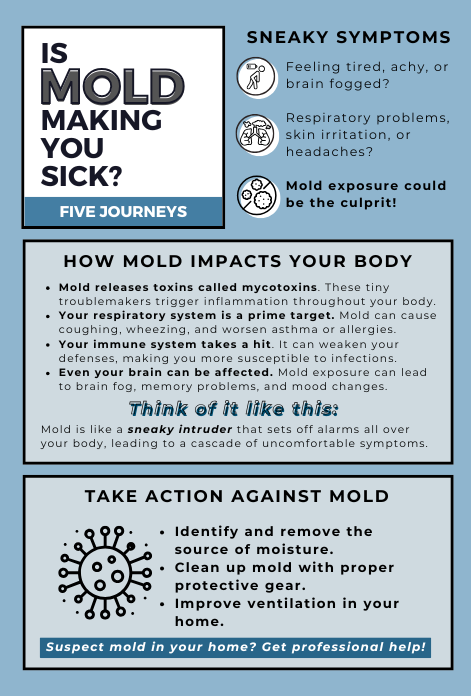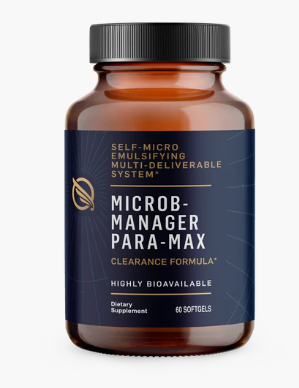Treatment for Mold Exposure
Discovering you’ve been exposed to mold can be alarming, especially when you start noticing its effects on your health. Mold can release toxins that impact your body in many ways, leading to a range of uncomfortable symptoms. But there’s good news: effective treatment options are available, and Five Journeys is here to guide you on your path to recovery. We understand the challenges of mold-related illness and are dedicated to providing personalized care that addresses your unique needs.
Key Takeaways
Mold exposure can lead to “mold toxicity” (or Chronic Inflammatory Response Syndrome – CIRS) in sensitive individuals, causing symptoms like fatigue, brain fog, aches, and respiratory, nasal, skin, and eye issues.
Addressing mold exposure is important to find relief from current symptoms and lessen the risk of long-term health problems like chronic respiratory conditions or a weakened immune system.
Self-care steps include minimizing mold contact, supporting natural detoxification, and managing stress.
Preventing future mold exposure involves controlling moisture (humidity, ventilation), promptly addressing leaks, cleaning your home regularly, and being mindful of outdoor mold sources.
Natural treatment approaches at Five Journeys may include dietary changes, herbal supplements, and lifestyle adjustments (like stress management, sleep, and gentle exercise).
Five Journeys offers a comprehensive and personalized approach to mold exposure support, using advanced testing (including Mycotoxins Mold testing) and blending conventional and functional medicine in Boston and Newton to help you regain your vitality.
What is Mold Toxicity?
Mold can sometimes release toxins called mycotoxins. When these mycotoxins build up in your body, they can cause various health problems. This is often called “mold toxicity,” and it can affect people in different ways. Some people are more sensitive to mold than others, and their bodies may have a harder time getting rid of these toxins. This can lead to a condition known as Chronic Inflammatory Response Syndrome (CIRS), where the body experiences ongoing inflammation and a range of symptoms like fatigue, brain fog, and aches. The good news is that with proper testing and treatment, it’s possible to identify the root causes of these symptoms and find ways to support your body’s natural healing process.Mold Exposure Symptoms
Mold exposure can affect people in different ways. You might experience a range of symptoms, or you might not notice any effects at all. It’s important to remember that not everyone reacts to mold similarly. However, if you’ve been in a damp or moldy environment and notice any of the following symptoms, it’s a good idea to talk to a healthcare professional.Respiratory Symptoms
If you’re sensitive to mold, you might experience respiratory symptoms like coughing, wheezing, shortness of breath, or frequent sneezing. These symptoms can be similar to those of allergies or a cold, so it’s helpful to consider if you’ve been exposed to mold recently. If your respiratory symptoms don’t go away or get worse, it’s important to seek medical advice to figure out what’s causing them.Nasal and Sinus Symptoms
Mold can also irritate your nose and sinuses, leading to congestion, irritation, a runny nose, or even nosebleeds. These symptoms can be quite bothersome and may disrupt your sleep and daily life. If you have ongoing nasal and sinus problems, it’s worth exploring whether mold exposure could be playing a role.Skin Symptoms
Sometimes, mold exposure can cause skin irritation, rashes, itching, or a burning sensation. It may even worsen existing skin conditions like eczema. Paying attention to any changes in your skin, especially after being in a damp environment, can help you pinpoint the cause and find the right treatment.Eye Symptoms
Mold can also affect your eyes, causing redness, itchiness, watering, or blurred vision. These symptoms can be uncomfortable and make it hard to go about your day. If you’re experiencing any persistent eye problems, it’s important to consider mold exposure as a possible cause and seek medical advice.Interested in Mold Exposure Treatment? Ask your provider or book a call with us!
Why is Treating Mold Exposure Important?
It’s important to address any concerns about mold exposure to support your overall health and well-being. Mold can sometimes contribute to a range of health issues, especially for those who are more sensitive. Seeking appropriate treatment can help you find relief from current symptoms and may reduce the risk of developing further problems. At Five Journeys, we take a holistic approach, considering all aspects of your health to understand the root causes of your symptoms and support your body’s natural healing ability.Prevents Long-Term Health Complications
Untreated mold exposure can increase your risk of developing chronic health problems. These can include respiratory conditions like asthma, neurological issues, and even an increased susceptibility to infections. By addressing mold exposure promptly, you can minimize the risk of mold toxicity complications and protect your long-term health.Reduces Respiratory Problems
Addressing mold exposure can often help improve respiratory symptoms like coughing, wheezing, and shortness of breath. This is because mold can sometimes irritate the airways and contribute to inflammation. By reducing inflammation and supporting healthy lung function, you can breathe easier and enjoy a better quality of life.Protects the Immune System
Mold exposure can weaken your immune system, making you more vulnerable to infections and other illnesses. Treatment for mold exposure often involves strategies to strengthen your immune system, helping your body fight off infections and recover faster.Alleviates Allergy-Like Symptoms
Many symptoms of mold exposure, such as sneezing, a runny nose, and itchy eyes, mimic allergies. By addressing the underlying mold exposure, you can reduce these allergy-like symptoms and experience relief.Self-Care Recommendations
While seeking professional treatment for mold exposure is essential, there are also self-care measures you can take to support your recovery. These include:
Minimizing your contact with mold
Try to identify and address any sources of mold in your home or workplace. This might involve fixing leaks, improving ventilation, and using dehumidifiers to reduce moisture.
Supporting your body’s natural detoxification processes
Drink plenty of water, eat a healthy diet, and consider incorporating gentle detoxifying practices like spending time in a sauna.
Managing stress
Stress can sometimes make the effects of mold exposure feel worse. Engage in stress-reducing activities like yoga, meditation, or spending time in nature.

How to Prevent Future Mold Exposure
Preventing future mold exposure is a key part of staying healthy and feeling your best. Here are some steps you can take to create a healthier home environment:
Control Moisture Levels
- Humidity: Aim for a relative humidity level below 50% throughout your home. You can use a dehumidifier to help with this, especially in damp areas like basements and bathrooms. Consider using a hygrometer to keep track of humidity levels in your home. This can help you identify problem areas and take action before mold becomes an issue.
- Ventilation: Let fresh air circulate throughout your home by opening windows and doors whenever possible. This is especially important in areas prone to moisture, like kitchens and bathrooms. Use exhaust fans when cooking, showering, and doing laundry to remove excess moisture. Make sure these fans vent outside, not just into your attic or crawl spaces.
- Heating: Proper heating helps to reduce humidity and prevent condensation on cold surfaces.
Address Leaks and Moisture Sources
- Repair any leaks in your roof, walls, or plumbing as soon as you notice them. Even small leaks can lead to mold growth if left unaddressed.
- Regularly inspect areas prone to leaks, such as under sinks and around appliances, to catch problems early on.
- Don’t let wet towels, clothes, or other materials pile up. Dry them quickly or remove them from the area.
Maintain a Clean Home
- Clean your home often, paying special attention to areas that tend to get damp, like bathrooms and kitchens.
- Consider using cleaning products that are specifically designed to kill mold in bathrooms and other high-moisture areas.
Additional Tips
- Avoid humidifiers: Unless medically necessary, avoid using humidifiers, as they can increase indoor humidity and promote mold growth.
- Be careful with indoor plants: Mold can thrive in the soil of indoor plants. If you have indoor plants, avoid overwatering them, and consider using pots with drainage holes.
- Store firewood outdoors: Don’t store firewood indoors, as it can harbor mold spores.
- Maintain air circulation: Ensure good air circulation between furniture and walls to prevent moisture buildup.
Natural Ways to Cure Mold Toxicity
Five Journeys believes in harnessing the power of natural therapies to support your body’s healing process. We understand that many people seeking a cure for mold exposure prefer a natural treatment for mold toxicity, and we strive to offer options that align with this preference. Our approach to mold toxicity treatment may include:
Dietary changes
We may recommend dietary adjustments to support your body’s natural detoxification processes and reduce inflammation. This might involve avoiding foods that tend to trigger inflammation, like processed foods and refined sugars, and focusing on whole, nutrient-dense foods that support liver function and gut health. Your liver and gut play a crucial role in filtering and eliminating toxins, so nourishing them is essential for your recovery journey.
Herbal supplements
Certain herbs can aid in detoxification and immune support. These natural remedies can help your body process and eliminate mold toxins more efficiently, reducing the burden on your system.
Lifestyle modifications
We may also discuss lifestyle changes that can significantly impact your recovery. This might include:
- Stress Management: Stress can intensify the effects of mold exposure. Finding healthy ways to manage stress, such as mindfulness practices, spending time in nature, and engaging in enjoyable activities, can support your body’s healing process.
- Prioritizing Sleep: Quality sleep is essential for your body to repair and regenerate. We may explore ways to improve your sleep hygiene and create a restful sleep environment.
- Quitting Smoking: Smoking can irritate the lungs and weaken the immune system, making you more susceptible to the effects of mold exposure. Quitting smoking is a powerful way to support your respiratory health and overall recovery.
- Gentle Exercise: Regular physical activity can boost your circulation, support detoxification, and reduce stress. We can help you find forms of exercise that feel good for your body and energy levels.
- Creating a Healthy Home Environment: This includes minimizing your exposure to mold by addressing moisture issues, ensuring good ventilation, and choosing mold-resistant materials.
Why Improve Your Health with Five Journeys?
Five Journeys offers a unique and comprehensive approach to mold exposure treatment. Our team of experienced practitioners understands the complexities of mold-related illness and is dedicated to providing personalized care that addresses your specific needs and goals. We use advanced testing, including Mycotoxins Mold testing, to accurately assess your exposure and identify the most effective treatment strategies. This, combined with our holistic approach that considers all aspects of your health – including your environment, lifestyle, and emotional well-being – makes us a leading choice for those seeking support from a mold health clinic. We are committed to empowering you to regain your health and vitality.
Holistic Approach
At Five Journeys, we recognize that true wellness encompasses more than just physical health. We take a holistic approach that considers all aspects of your well-being, including physical, emotional, mental, and spiritual health.
Personalized Care
We understand that each individual is unique, and their health needs are different. That's why we tailor our services to meet your specific needs and goals. Whether you're seeking preventive care, managing chronic conditions, or optimizing your overall health, we provide personalized solutions that prioritize your well-being.
Insurance Accepted
Mold exposure can significantly impact your health, but effective treatment options are available. By seeking professional guidance and implementing self-care strategies, you can overcome mold-related illness and other chronic diseases. At Five Journeys, we offer a supportive and personalized approach to mold exposure treatment, combining the best of conventional and functional medicine in Boston and Newton. We are dedicated to helping you achieve optimal health and live a fulfilling life free from the burden of mold toxicity.
References
Berndtson, K. (2013). Chronic Inflammatory Response Syndrome. Retrieved from https://nvlv.nl/downloads/Inflammation_Berndtson_essay_2_CIRS.pdf Bush, R. K., Portnoy, J. M., Saxon, A., Terr, A. I., & Wood, R. A. (2006). The medical effects of mold exposure. The Journal of Allergy and Clinical Immunology, 117(2), 326–333. https://doi.org/10.1016/j.jaci.2005.12.001 Hurraß, J., et al., Medical diagnostics for indoor mold exposure. Int. J. Hyg. Environ. Health (2016), http://dx.doi.org/10.1016/j.ijheh.2016.11.012Why we do, What we do...






























